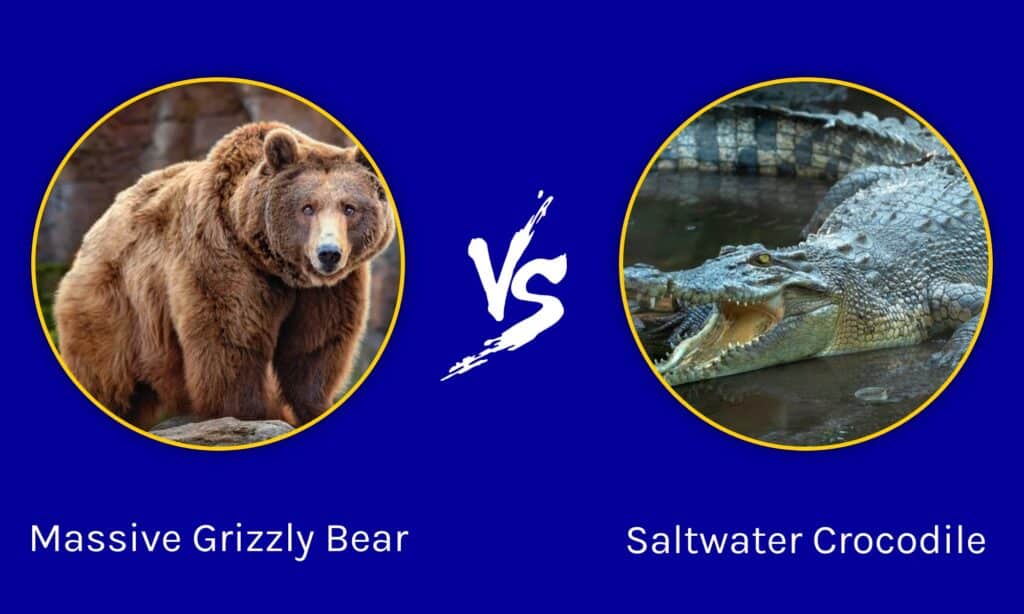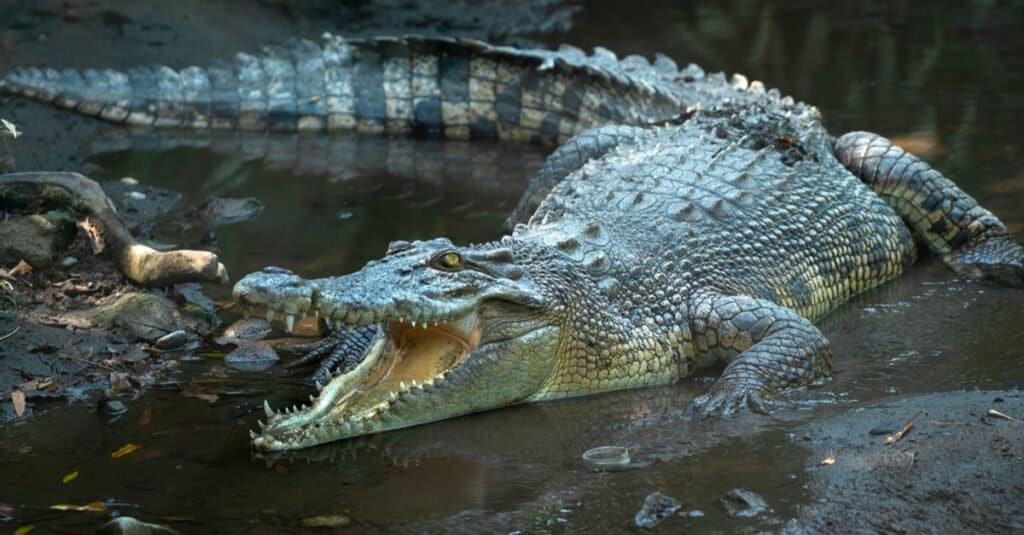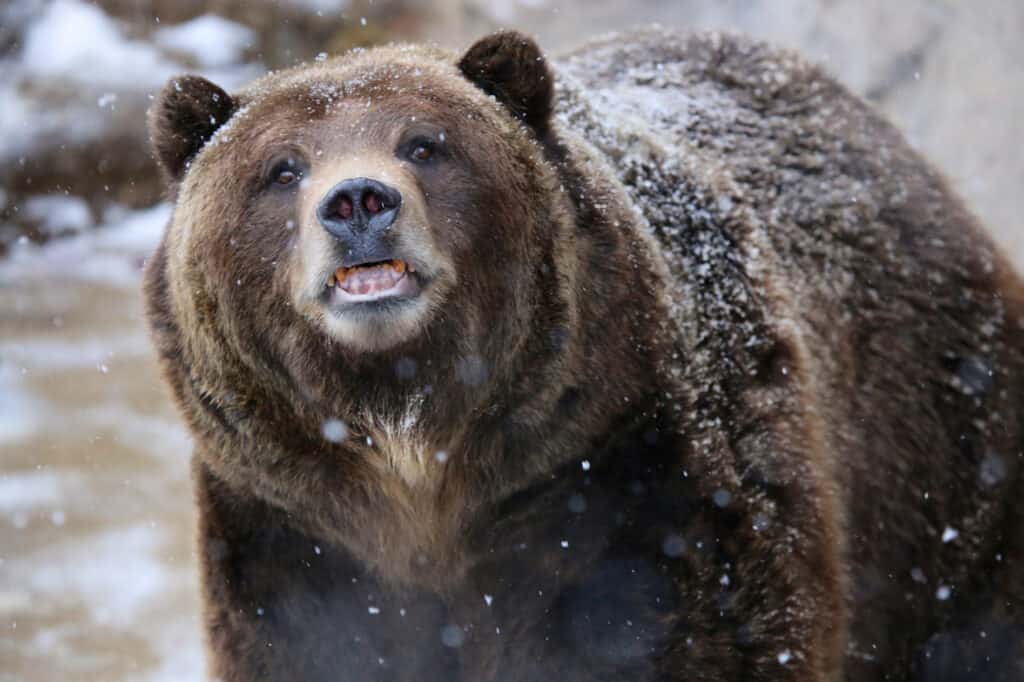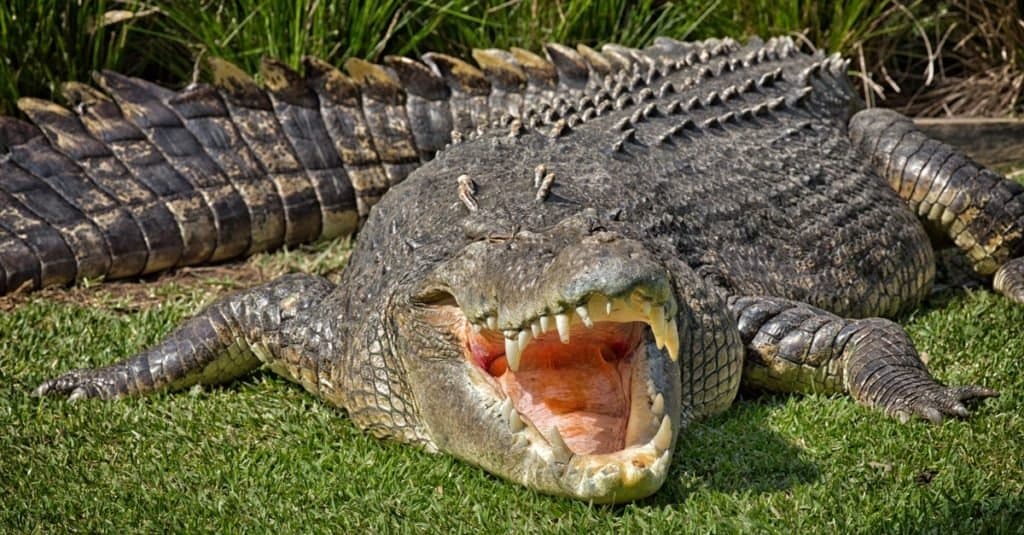We have previously discussed what would happen if a bear were to fight a crocodile. This time, though, we’re going to make it an epic battle. We’re not pitting your average grizzly bear against an American crocodile. We’re going to use the super heavyweights. What would happen in a fight between a massive grizzly bear vs a saltwater crocodile?
We’re going to use the available data about these creatures along with a sprinkle of imagination to figure out which creature would win this battle. We’ll imagine that a saltwater crocodile in a zoo in the northwest U.S. got loose and found itself along the coastline where a massive, hungry grizzly bear had shown up to look for salmon!
Comparing a Massive Grizzly Bear and a Saltwater Crocodile

| Categories | Massive Grizzly Bear | Saltwater Crocodile |
|---|---|---|
| Size | – Weight: 1,200 lbs – Length: Can measure 7 feet to 10 feet long – Height: Often measure 3.5-4.5 feet tall at the withers | – Weight: 400- 1,150 lbs, up to 2,200 lbs – Length: 10-21 ft, up to 23 ft or longer |
| Speed and Movement Type | – 35 mph on land – Can sustain running speeds over 1 mile – Swims at 6 mph in the water | – Can run between 12 and 22 mph on land for very short distances – 15-18 mph in the water by propelling its body with its tail |
| Defenses | – Have thick skin that can absorb blows and some bites – Their large size can scare enemies away – May bluff charge its prey | – The scales on its body protect it from bites and scratching – Ability to travel on land and water – Mobility and speed in water help it escape danger |
| Offensive Capabilities | – A bite force of 975 PSI – Has 42 teeth, 1-inch teeth with fangs that measure up to 3 inches – Delivers strong bites and uses a vicious shaking technique – Has 4-inch claws that are somewhat dull – Can use its large, thick paws to smack or slash prey with its claws – Their claws aren’t extremely sharp – Grizzlies use their weight to stop prey from moving while attacking | – Has 3,700PSI bite power – Possesses 66 conical teeth – Teeth measure 4 inches in length – A deathroll can remove large chunks of flesh or break limbs |
| Predatory Behavior | – Grizzly bears tend to be opportunistic predators as well as cursorial predators that will weaken their foe before killing it – Grizzly bears often scavenge for food | – Ambush predators that attack from the water – Attempt to drown or dismember their prey |
What Are the Key Differences Between a Massive Grizzly Bear and a Saltwater Crocodile?
The most significant differences between a massive grizzly bear and a saltwater crocodile are their morphology and size. Grizzly bears are large, thick-bodied, quadrupedal mammals with dense fur and short tails, but saltwater crocodiles are massive, long, scaly reptiles with elongated snouts and long tails that help propel them through the water.
A massive grizzly bear weighs 1,200 pounds, grows 10 feet in length, and stands 4.5 feet at the shoulder. Meanwhile, a saltwater crocodile weighs between 400 and 1,150 pounds and measures anywhere from 10 to 21 feet long. These massive creatures are very distinct from one another, and that necessitates a closer look at the animals to see which has the advantage in a fight.
What Are the Key Factors in a Fight Between a Massive Grizzly Bear and a Saltwater Crocodile?
The massive sizes of these animals make it important to examine multiple facets of their bodies as well as their instincts to determine which of them would survive this battle. In this case, we’re going to examine elements of size, speed and movement, defenses, offense, and predatory behavior to determine the winner.
We’ll examine each facet, determine which animal has the bigger advantage, and then use that data to inform our decision about the winner of this epic battle. Without further ado, let’s get started looking at the information.
Massive Grizzly Bear vs Saltwater Crocodile: Size

Saltwater crocodiles are longer and heavier than grizzly bears.
©Pius Rino Pungkiawan/Shutterstock.com
The largest grizzly bear ever recorded weighed less and was shorter in length than the largest saltwater crocodile. Nevertheless, the biggest grizzly bear is still a massive creature that stands 4.5 feet tall at the shoulder, measures 10 feet in length, and weighs 1,200 lbs.
Meanwhile, a saltwater crocodile can measure anywhere between 400 and 1,150 lbs, but they tip the scales at over 2,000 lbs at their largest. Moreover, they grow between 10 and 21 feet long, but they can reach 23 feet long!
Saltwater crocodiles have the length and weight advantage, so they get the advantage in this fight.
Massive Grizzly Bear vs Saltwater Crocodile: Speed and Movement

The grizzly bear has the speed advantage only on land.
©Steve Boice/Shutterstock.com
The average grizzly bear can run up to 35 mph over short distances and maintain a speed of 20 mph for distances of a mile. They are adept in the water, but they can only move at about 6 mph in that case.
However, saltwater crocodiles can scamper along the ground at 12 to 22 mph over very short distances, and they can move at speeds of 15 to 18 mph in the water.
On land, a massive grizzly bear has the speed advantage, but the crocodile has an advantage in the world.
Massive Grizzly Bear vs Saltwater Crocodile: Defenses
Saltwater crocodiles have very strong physical defenses. Their scaly skin is so thick and tough that a lot of creatures simply can’t hurt them with claws or jaws. They can travel on land and in the water, and their speed in the latter helps them escape danger. Moreover, they blend in very well with their surroundings when they are in the water.
Grizzly bears have dense fur and thick skin that can help protect them to an extent. Their thick bodies and tough bones also do a lot to keep them safe. Also, their size is enough to keep most creatures from attacking them outright. They are fast animals that can easily traverse many types of terrain, helping them escape and making them powerful predators.
Saltwater crocodiles have a defensive advantage in this fight.
Massive Grizzly Bear vs Saltwater Crocodile: Offensive Capabilities
The offensive powers of saltwater crocodiles are hard to understate. These reptiles have 66 teeth and a massive snout that allows them to dig in with dozens of them at once. The crocodile’s teeth are 4 inches long, and they bite with a power of 3,700 PSI, one of the strongest bites in the animal world.
Their bites are deadly and capable of instantly causing fatal injuries to prey. They use an attack called a deathroll to rip off chunks of flesh and limbs in a few seconds. Also, crocodiles will bite and hold their prey to drag them into the water and drown them while chomping down.
Bears maul their prey using a bite with a power of 975 PSI, 4-inch claws, the weight of their bodies, and immense power. Their attack utilizes several dimensions, and it’s very effective.
Grizzly bears have more methods of attack, but the saltwater crocodile’s vicious assaults are more effective at killing prey.
Massive Grizzly Bear vs Saltwater Crocodile: Predatory Behavior
Saltwater crocodiles are ambush predators. They wait at the water’s edge and burst forth to grab prey and kill them. Their attacks are swift, but if they don’t get their prey on the first or second try, they pretty much have to start over. Few animals are going to stick around after an attempted killing.
Bears are also very aggressive. They stalk their prey until they spot them and then chase them down with their surprising speed. They’ll hunt down their prey, jump on its back, bring it to the ground, and finish it. They aren’t afraid to pursue prey over long distances to ensure a kill.
A massive grizzly bear’s mauling is superior to the ambush predation of the saltwater crocodile.
Who Would Win in a Fight Between a Massive Grizzly Bear and a Saltwater Crocodile?

The battle between a saltwater crocodile and a massive grizzly bear would be won by a saltwater crocodile.
©PomInOz/Shutterstock.com
A saltwater crocodile would win a fight against a massive grizzly bear. If the fight starts near a body of water where the crocodile is waiting for prey, then the fight would favor the crocodile landing the first, deadly strike. If the crocodile latched onto the bear’s leg or head, the injury would be devastating.
The saltwater crocodile is too powerful and has too many offensive advantages to lose near the water. However, on land, the fight would be a lot closer. The grizzly bear is more agile on land and can use its body to weigh down the saltwater crocodile, preventing it from moving.
On land, it’s harder for a crocodile to land a bite, and it’s even harder to death-roll without the water. Yet, the grizzly bear would have to try very hard to kill a saltwater crocodile. Their bite would have trouble piercing the scales of the croc enough to kill it.
Furthermore, their dull claws aren’t going to cut the creature to death. They could potentially swat the crocodile, slamming its head, or destroying its eyes, but that would put them at risk of a bite from the crocodile. The intelligent grizzly bear could also try to flip the crocodile over to get to softer parts, but even that’s a risk.
One thing is for certain: if the crocodile bites, it’s not letting go. That’s why, in this case, we’re calling the winner the saltwater crocodile, especially if it’s one of the very large ones.
The photo featured at the top of this post is © PomInOz/Shutterstock.com
Sources
- University of Montana (1970) cfc.umt.edu/grizzlybearrecovery/grizzly-bears/biology.php#:~:text=Grizzly bears are opportunistic omnivores,fungi%2C nuts%2C and ungulates.
- U.S. Fish & Wildlife Service, Available here: https://fws.gov/species/grizzly-bear-ursus-arctos-horribilis
Thank you for reading! Have some feedback for us? Contact the AZ Animals editorial team.






